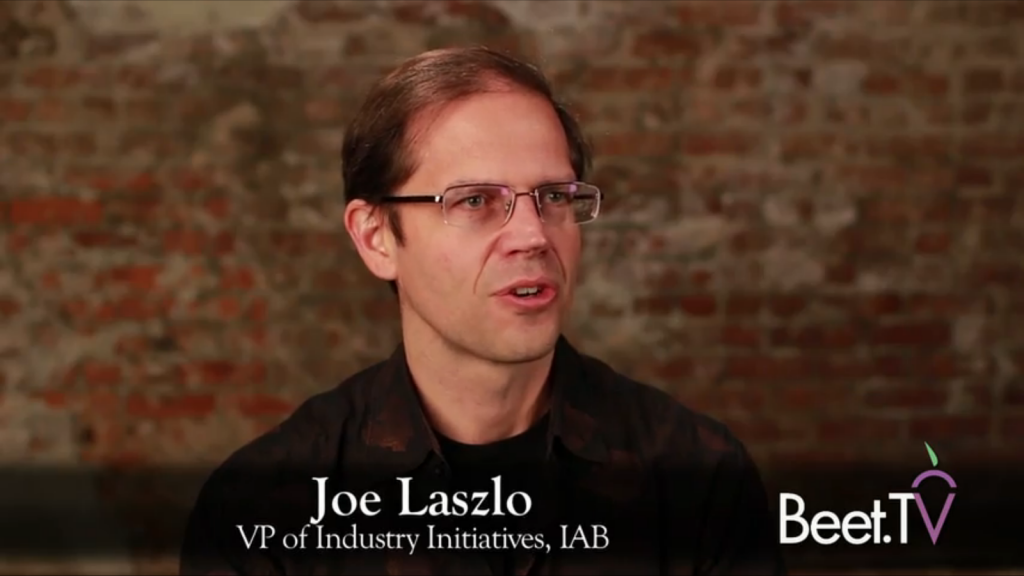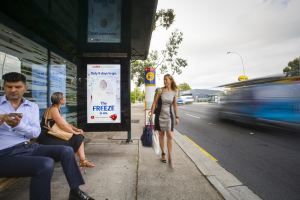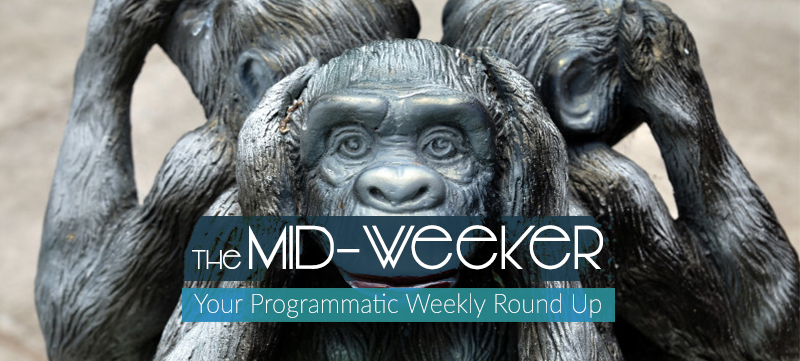IAB Mulls ‘Header Bidding 101’ To Help Standardize Latest Ad Tech

IAB’s Joe Laszlo talks about the importance of header bidding, and explains how his organisation aims to educate the masses on it Watch here
2016: The Year of Programmatic Creative?
 As the battle between programmatic trading and creativity continues to rage on, the question that we must ask is whether or not 2016 is the year of programmatic creative. Programmatic creative is the enabling of intelligent creative, where each person is exposed to a brand’s message that adapts, changes, and is personalised to them, regardless of the device or site they’re on. Glen Calvert, of Consultancy.com, outlines how programmatic advertising will impact the role of marketing professionals, and states that “in short, programmatic creative enables the intelligent manipulative of the creative based on what you know about that cookie ID, and the automated use of live data inside the creative so it’s increasingly personalised for the individual. Read More
As the battle between programmatic trading and creativity continues to rage on, the question that we must ask is whether or not 2016 is the year of programmatic creative. Programmatic creative is the enabling of intelligent creative, where each person is exposed to a brand’s message that adapts, changes, and is personalised to them, regardless of the device or site they’re on. Glen Calvert, of Consultancy.com, outlines how programmatic advertising will impact the role of marketing professionals, and states that “in short, programmatic creative enables the intelligent manipulative of the creative based on what you know about that cookie ID, and the automated use of live data inside the creative so it’s increasingly personalised for the individual. Read More
Don’t Sleep on Third-Party Data
 With the assumption that “first-party and second-party data are more actionable, and of much higher quality than third-party data”, Peter LaFond, of MediaPost, tells us that is is wrong to think this, and here’s why. Data quality is not determined by its relative point of origin, being first, second, or third-party. The quality comes from a whole range of factors, such as how the data was sourced, how the data was cleaned for errors, the frequency with which the data is refreshed relative to its lifespan, etc… LaFond finishes by saying that third-party data is not intrinsically less valuable than second or first-party. It just takes the right kind of intelligence to deploy successfully. When it does, it’s as powerful and impactful as anything else. Read more.
With the assumption that “first-party and second-party data are more actionable, and of much higher quality than third-party data”, Peter LaFond, of MediaPost, tells us that is is wrong to think this, and here’s why. Data quality is not determined by its relative point of origin, being first, second, or third-party. The quality comes from a whole range of factors, such as how the data was sourced, how the data was cleaned for errors, the frequency with which the data is refreshed relative to its lifespan, etc… LaFond finishes by saying that third-party data is not intrinsically less valuable than second or first-party. It just takes the right kind of intelligence to deploy successfully. When it does, it’s as powerful and impactful as anything else. Read more.
Survey: 72% of Marketers are Victims of Fraud
 Performinsider have recently carried out a survey to find out what exactly was happening in the trenches with marketers in regards to fraud and CPA affiliate networks. On top of their finding that 72% of marketers are victims of fraud, the survey also found that 82% of all marketers say fraud is a serious problem in performance marketing, and 84% of networks use some sort of fraud detection program. However what do all of these facts mean? The answer, according to experts, is that despite the overwhelming issues, very few CPA Networks wanted to speak about the issues at hand. Read more
Performinsider have recently carried out a survey to find out what exactly was happening in the trenches with marketers in regards to fraud and CPA affiliate networks. On top of their finding that 72% of marketers are victims of fraud, the survey also found that 82% of all marketers say fraud is a serious problem in performance marketing, and 84% of networks use some sort of fraud detection program. However what do all of these facts mean? The answer, according to experts, is that despite the overwhelming issues, very few CPA Networks wanted to speak about the issues at hand. Read more
US Internet Users Rely on Mobile Devices for Digital Access
 Today, more and more people in the US are relying on their mobile devices for digital access. eMarketer has come out with research which has confirmed what we have all suspected for some time, mobile is rising rapidly. However, they have also predicted a major decline in users who are using desktop only, with 32 million US users using desktop in 2014, only 10 million are expected to be using desktops by 2020. Further to this more than 8 in 10 people in the US will use a mobile phone in 2016. Read more.
Today, more and more people in the US are relying on their mobile devices for digital access. eMarketer has come out with research which has confirmed what we have all suspected for some time, mobile is rising rapidly. However, they have also predicted a major decline in users who are using desktop only, with 32 million US users using desktop in 2014, only 10 million are expected to be using desktops by 2020. Further to this more than 8 in 10 people in the US will use a mobile phone in 2016. Read more.
Adshel Continues Push for Programmatic OOH

Adshel has moved one step closer to its aim of making programmatic outdoor a reality in 2016, with the release of a digital buying platform it’s dubbed “programmable” buying. The APN News and Media-owned outdoor company says its programmable buying platform gives agencies access to digital out of home inventory through a trading desk, migrating offline sales online, to reduce friction. The programmable push comes as part of Adshel’s launch of creative ad-serving platform Adsmart, which allows advertisers to update copy or creative when trigger points are touched on. Read more.
Who Should Be Responsible For Stopping Programmatic Ad Fraud?
 The programmatic ad ecosystem is very compartmentalised in nature. There are sell-side technologies and buy-side technologies, each serving their own constituents. But ad fraud impacts all participants, and it is in everyone’s long-term interest that it be stamped out. While most individual players have been reluctant to even discuss its existence – for fear of being the one who opened Pandora’s box. Take a look at what Marketingland has to say when it comes to who should be responsible for stopping programmatic ad fraud. Read more.
The programmatic ad ecosystem is very compartmentalised in nature. There are sell-side technologies and buy-side technologies, each serving their own constituents. But ad fraud impacts all participants, and it is in everyone’s long-term interest that it be stamped out. While most individual players have been reluctant to even discuss its existence – for fear of being the one who opened Pandora’s box. Take a look at what Marketingland has to say when it comes to who should be responsible for stopping programmatic ad fraud. Read more.


